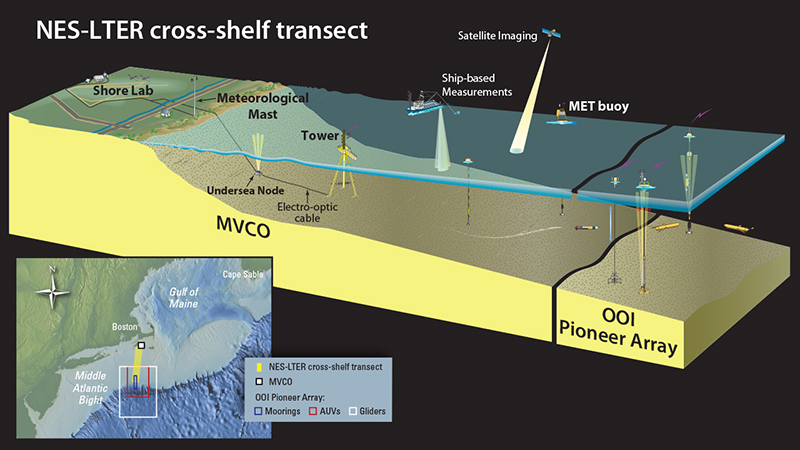
Studies at the newly established NES-LTER will help better understand and manage the intricate coastal ocean ecosystem. The site will involve cross-shelf research cruises between—the Martha's Vineyard Coastal Observatory (MVCO) to the north and the Ocean Observatories Initiative (OOI) Pioneer Array to the south—and will be bolstered by collaborations with researchers from Maine to North Carolina. The NES-LTER cross-shelf transect is centered on 40.75 N, 70.65 W. (Illustration by Jack Cook, Woods Hole Oceanographic Institution)
Northeast US Shelf New Long-Term Ecological Research
The Northeast US Shelf (NES) ecosystem spans the Middle Atlantic Bight and Gulf of Maine, is a large portion of the NW Atlantic Shelves Province, and is in a coastal biome. The waters over the NES provide an array of ecosystem services including fishing, energy development, shipping, waste disposal, recreation, and conservation. The NES ecosystem, like other productive temperate shelf ecosystems, is characterized by strong seasonality along with high levels of variability in physical forcing at timescales from days to decades, including climate impacts.
The overarching goal of the NES-LTER is to understand and predict how planktonic food webs change through space and time in response to changes in the physical environment, and how those changes impact ecosystem productivity, particularly of higher trophic levels. Observations and models will focus on processes and mechanisms that structure pelagic food webs, trophic transformations, and productivity, as well as the key interactions and feedbacks that modulate relationships among them.
The NES-LTER is a new LTER site, and the project formally started in September 2017. The site will build on existing regional observations and on-going time series from the Martha's Vineyard Coastal Observatory (MVCO), the Ocean Observatories Initiative (OOI) Pioneer Array, and NOAA-supported Ecosystem Monitoring (EcoMon) surveys.
Related Information
- WHOI's Oceanus magazine: Long-term Study Focuses on New England Ocean: Research to explore abundant, rapidly changing ecosystem
- The Northeast US Shelf (NES) LTER project is funded by NSF OCE 1655686
- Northeast US Shelf (NES) LTER Phase 1 proposal 2016
- Link to public Google calendar
- Link to announcement for NES-LTER Research Experiences for Undergraduates (REUs)
In the News
- 21 Feb. 2018: Oceans Deeply "New Long-Term Effort to Understand Impact of Rapidly Changing Atlantic"
Contact
Heidi M. Sosik
Lead Principal Investigator
Stace Beaulieu
Information Manager
Kama Thieler
NES-LTER REUs
Annette Brickley
NES-LTER Schoolyard
lter-nes-info@whoi.edu
508-289-3292
About this site
 This site is a member of the LTER Network. This material is based upon work supported by the National Science Foundation under grant OCE# 1655686, 09/01/2017-08/31/2022.
This site is a member of the LTER Network. This material is based upon work supported by the National Science Foundation under grant OCE# 1655686, 09/01/2017-08/31/2022.
Any opinions, findings, conclusions, or recommendations expressed in the material are those of the author(s) and do not necessarily reflect the views of the National Science Foundation.


